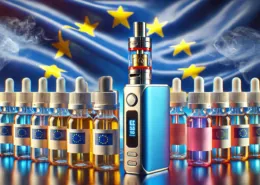Thailand Approves 5 E-Cigarette Control Measures
The Thai Cabinet has approved five significant measures proposed by the National Health Commission to regulate e-cigarettes, government spokeswoman Sasikarn Watthanachan announced on Tuesday. These measures aim to address the sale, promotion, and use of vaping products through a multi-faceted approach involving education, public awareness, enhanced law enforcement, network collaboration, and strong policy adherence.
The five approved measures are as follows:
- Development of Knowledge Regarding E-cigarette Dangers: This initiative will focus on educational institutions. Schools are to be declared e-cigarette-free zones. Curriculum will be updated to include specific teachings on the drawbacks of vaping, and schools will organize activities to raise awareness among students.
- Enhancing Public and Youth Awareness: Broader awareness campaigns will be conducted to inform both young people and the general public about the risks associated with e-cigarette use. Public relations media will be developed and utilized to support and amplify these campaigns.
- Monitoring and Law Enforcement Against Vaping: New legal measures and regulations will be introduced to supervise broadcast media and prevent the promotion of e-cigarettes. Manuals will be issued to television program and film producers to guide them in avoiding e-cigarette publicity. Furthermore, relevant authorities will conduct surveys on e-cigarette availability at least every two years.
- Developing Potential of Partner Networks Against Vaping: This measure involves engaging various sectors. For instance, logistics businesses will be formally warned that transporting e-cigarettes is illegal, aiming to disrupt online sales channels. Local administrative organizations will also be mandated to launch awareness campaigns to protect communities, particularly children, from e-cigarette exposure.
- Affirming Policies and Measures Against E-cigarette Sale and Abuse: All government agencies must strictly adhere to existing and future policies and measures designed to combat the sale and misuse of e-cigarettes. These policies are to be based on established international guidelines, including the World Health Organization Framework Convention on Tobacco Control (WHO FCTC), the UN Convention on the Rights of the Child, and Thailand’s Children Protection Act BE 2546.
The spokeswoman confirmed that all relevant government agencies will be directed to implement and enforce these five measures accordingly, marking a significant step in Thailand’s approach to e-cigarette regulation.
- Cannabis and Vape Shop Workers Rank Happiest in Nation - July 31, 2025
- Richmond, VA, Restricts New Vape & Tobacco Shop Locations - July 31, 2025
- Study Finds Flavored Vape Bans Cut Vaping But May Slow Smoking Decline - July 31, 2025









